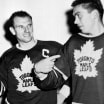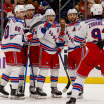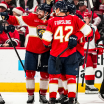Dan Rusanowsky was an 18-year-old freshman at St. Lawrence University when his voice was first heard on the radio. He still thinks it was a trick, or a test, that got him on the air.
Forty-four years later, Rusanowsky, the only radio broadcaster in San Jose Sharks history, is receiving the highest honor in his profession, a plaque in the Hockey Hall of Fame as the 44th person selected by the NHL Broadcasters' Association to receive the Foster Hewitt Memorial Award for outstanding contributions as a hockey broadcaster.
Rusanowsky, 62, will be honored during a luncheon at the Hockey Hall of Fame in Toronto on Nov. 13.
"The first thing that comes to mind is just living the dream every day being in the NHL," Rusanowsky said. "The other side of it is I've always had a great deal of interest in creating the picture for the fan. For me, that's just a great challenge.
"When I was growing up, I was in plays, in theater a little bit, and I enjoyed getting in front of people and performing, but the way that it worked out I just wasn't as comfortable pursuing that. I found a niche in a place that I just really love. I had developed this love for hockey from a very early age and the art of doing that, along with the relationships we have with all the great people in the game and the fans that are so great in San Jose or wherever we go in the NHL, that's what gets me excited."
Rusanowsky's story in hockey traces to Oct. 24, 1971, eight years before he got on the air. He was a 10-year-old living in Milford, Connecticut, and he made his first trip to Madison Square Garden to see the New York Rangers and Pittsburgh Penguins with his uncle on his mother's side.
It ended 1-1. Pete Stemkowski was playing for the Rangers. Years later he'd become Rusanowsky's broadcast partner.
"I remember listening to the pregame show coming in and the postgame stuff on the radio going out on the way after," Rusanowsky said. "That introduced me to the idea that hockey was available on the radio. That's where it all began."
As a freshman at St. Lawrence in Canton, New York, Rusanowsky introduced himself to Bob Vilas, the Saints play-by-play announcer, and told him he wanted to be a hockey broadcaster. Vilas told him to practice into a tape recorder and maybe later in the season he'd get a chance to call some games.
Then Vilas surprised Rusanowsky with an opportunity to get on the air sooner, as in immediately.
"He comes up to me in the first intermission of this game against Harvard and says to me, 'I have an interview guest scheduled, a 'Hockey News' reporter that is scheduled to come up here, he covers the ECAC and I need you to do the interview,'" Rusanowsky said. "I said, 'Don't you normally do it?' He said, 'I've got to go to the bathroom and you're on the air in 30 seconds. Good-bye.' And he was gone."
The Saints games were on National Public Radio, so there were no commercial breaks. Rusanowsky had no choice. He did the interview.
"I still think to this day maybe that wasn't true or maybe it was, but I think he was putting me into a position where we have to be quite a bit in our business, expect the unexpected and be prepared to do something that doesn't exactly go according to plan," Rusanowsky said. "I wish I had a tape of it. It was probably the worst interview in history, but I got through it."
Soon he was the color commentator next to Vilas, and by his junior year he was calling games full-time on professional radio. His first game was at Rensselaer Polytechnic Institute, in Troy, New York, where his uncle, the one that took him to Madison Square Garden, had gone to school.
Rusanowsky went to Clarkson University to get his M.B.A. on the off chance that his broadcasting career didn't pan out, but he kept calling St. Lawrence games until 1986, when he moved to the American Hockey League and called games for the New Haven Nighthawks.
That lasted until 1991, when he got the job with the expansion Sharks. His first NHL game, the Sharks' first game, was a 4-3 loss at the Vancouver Canucks on Oct. 4.
"It's the only recording of any Sharks broadcast that night because it was a radio-only game in the Bay Area," Rusanowsky said.
Rusanowsky will have called 2,425 of the Sharks' 2,452 regular-season games and all 241 Stanley Cup Playoff games by the time he arrives in Toronto early Saturday after flying in on a red eye from Las Vegas, where he will be on the air Friday calling the Sharks and Vegas Golden Knights. He will miss the game against the Anaheim Ducks on Sunday, only the 28th Sharks game he has missed. The first 27 were in the 2000-01 season, when Rusanowsky was recovering from a car accident that left him with life-threatening injuries.
"The one thing that you have to start with before you even talk about broadcaster is the word love," said Bret Hedican, one of Rusanowsky's broadcast partners. "When I think about Dan Rusanowsky and I think about him as a broadcaster, before you even get to the broadcast part you just have to know he loves what he does. He's passionate about the San Jose Sharks. He's passionate about what he does as far as providing a product online, the audio network, and obviously the traditional radio back in the day.
"He absolutely loves what he does. After that, when you know somebody loves what they do, they're going to be great at it. Dan Rusanowsky is absolutely great at what he does."


















